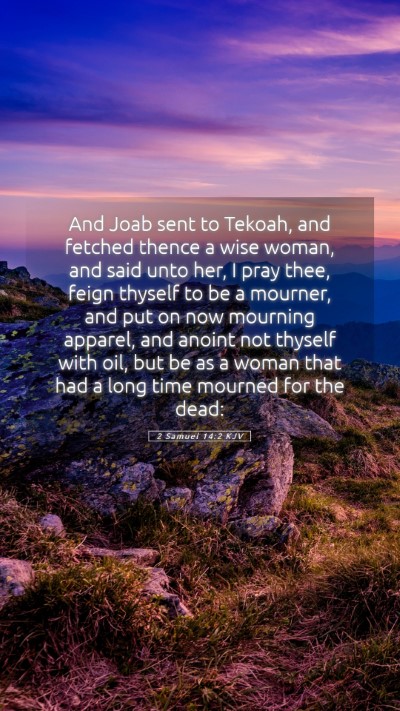2 Samuel 14:2 - Bible Verse Meaning and Interpretation
The verse 2 Samuel 14:2 reads: "And Joab sent to Tekoah, and fetched thence a wise woman, and said unto her, I pray thee, feign thyself to be a mourner, and put on now mourning apparel, and anoint not thyself with oil, but be as a woman that had a long time mourned for the dead." This verse presents a complex interplay of themes, including wisdom, deception, and the human condition regarding grief and reconciliation.
Understanding 2 Samuel 14:2
This passage highlights Joab's cunning strategy to influence King David regarding his estranged son Absalom. By employing a wise woman from Tekoah to feign mourning, Joab manipulates the king's emotions to achieve political ends. Here are some insights gathered from public domain commentaries.
-
Matthew Henry's Commentary: Matthew Henry emphasizes the depth of human emotion involved in mourning and how Joab seeks to tap into this. The wise woman’s role illustrates how the portrayal of grief can influence a leader's heart. Henry points out that Joab was aware of David's unresolved feelings regarding Absalom and orchestrated this scheme to encourage reconciliation.
-
Albert Barnes' Notes: Barnes discusses the significance of Tekoah, asserting that Joab’s choice of a wise woman suggests a strategic plan that encompassed not just wisdom but a cultural understanding of mourning rituals. This indicates the power of narrative and representation in influencing royal decisions.
-
Adam Clarke's Commentary: Clarke explores the nuances of deception involved in the narrative, noting that while the woman pretends to grieve, her purpose is to communicate a deeper truth about familial relationships and forgiveness. He urges readers to consider how appearances can be manipulated for a greater good, even if through morally ambiguous means.
Key Themes and Lessons
The account serves as an insightful study in emotional intelligence and leadership. Joab’s strategic use of a wise woman to approach David underscores the complexities of leadership where personal emotions and political duties collide.
-
Wisdom in Leadership: The choice of a wise woman illustrates that effective leadership often requires shrewdness and an understanding of human nature.
-
Emotional Manipulation: Joab’s plan indicates that emotions are a double-edged sword in governance; they can lead to compassion or exploitative manipulation.
-
Reconciliation and Forgiveness: The ultimate goal of Joab's scheme is to reconcile David and Absalom, which reflects the Biblical theme of restoration in family relationships.
Application of 2 Samuel 14:2
This verse can lead to some poignant Bible study insights, particularly in the areas of leadership, conflict resolution, and emotional intelligence. Reflecting on this passage, believers can draw lessons applicable to their personal and communal lives.
- Engage in Honest Communication: This passage encourages individuals to be honest about their feelings and to seek reconciliation rather than to operate in deception.
- Wisdom in Action: It highlights the need for wisdom in decision-making, especially in balancing personal feelings with broader responsibilities.
- Cultural Sensitivity: Understanding the emotional and cultural dynamics at play can enhance dialogue during conflicts.
Cross References
- 2 Samuel 13:39: This passage hints at David's feelings of estrangement regarding Absalom.
- Genesis 37:35: The grief exhibited by Jacob illustrates how deep mourning can affect familial dynamics.
- Matthew 18:15-17: This New Testament instruction on addressing grievances mirrors themes of reconciliation present in 2 Samuel 14.


